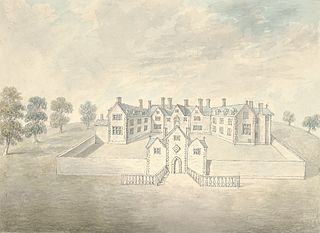
Sir Robert Harley was an English statesman who served as Master of the Mint for Charles I and later supported the parliamentarians during the English Civil War.
John Desborough (1608–1680) was an English soldier and politician who supported the parliamentary cause during the English Civil War.

Edward Glyn Davies is a Conservative Party politician in the United Kingdom. He was the Member of Parliament (MP) for Montgomeryshire from May 2010 to November 2019, and is a former member of the National Assembly for Wales in the Mid and West Wales region.
Colonel Philip Jones was a Welsh military leader and politician who sat in the House of Commons between 1650 and 1656. He rose to the rank of Colonel in the service of the Parliamentary Army under Fairfax during the English Civil War. As Governor of Swansea he successfully held the town against the Royalist forces.
James Philipps was a Welsh politician who sat in the House of Commons between 1653 and 1662. He was a supporter of the Parliamentary cause during the English Civil War.
John Clarke, also known as John Clark, John Clerk, and John Clerke, was an English politician and Justice of the Peace who sat in the House of Commons from 1653 through 1660, and was a colonel in the Parliamentary army between 1651 and 1659.
Sir William Ellis (1609–1680) was an English lawyer, judge and politician who sat in the House of Commons at various times between 1640 and 1679, and supported the Parliamentary cause in the English Civil War.
Sir John Pryce, 1st Baronet, sometimes also spelt Price, was an Anglo-Welsh Baronet and Member of Parliament.
James Lewis was a Welsh politician who sat in the House of Commons at various times between 1624 and 1656. He supported the Royalist and then the Parliamentary side in the English Civil War.
George Twisleton was an English politician who sat in the House of Commons at various times between 1654 and 1659. He served as a colonel in the Parliamentary army in the English Civil War.
Richard Price was a Welsh politician who sat in the House of Commons in 1653. He fought in the Parliamentary army in the English Civil War.
Hugh Courtenay was a Welsh politician who sat in the House of Commons in 1653. He was an active parliamentary officer in the English Civil War.
Sir John Carter was an English politician who sat in the House of Commons at various times between 1654 and 1660. He served in the Parliamentary army in the English Civil War.
John Bridges was an English politician who sat in the House of Commons in 1654 and 1656. He fought in the Parliamentarian army in the English Civil War.

Edward Vaughan (c.1600–1661) was a Welsh politician who sat in the House of Commons at various times between 1626 and 1661.
Lumley Thelwall was a Welsh politician who sat in the House of Commons in 1656.
Nathaniel Whetham was an English baker and politician who sat in the House of Commons between 1654 and 1659. He fought in the Parliamentary army in the English Civil War.

Alun Craig Williams is a British Conservative Party politician. He was the Member of Parliament (MP) for Cardiff North from 2015 to 2017 and at the 2019 general election was elected as the MP for Montgomeryshire.
Sir Pryce Edward Pryce-Jones, 1st Baronet TD was Conservative MP for Montgomery Boroughs.




